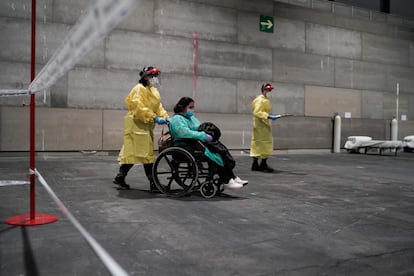Spanish government to extend state of alarm for 15 days
Prime Minister Pedro Sánchez made the decision after warning Spaniards that the number of coronavirus cases was set to rise over the next week

The Spanish government wants to extend the state of alarm, declared on March 14 in a bid to slow the coronavirus outbreak, for another 15 days. Spanish Prime Minister Pedro Sánchez informed regional leaders of the decision during a teleconference on Sunday. The exceptional measure was approved by the Spanish Cabinet on March 14 and came into effect the following day. It was set to last until March 29.
If approved by Congress, the lockdown will continue until April 11
Sánchez needs the approval of Spain’s lower house, the Congress of Deputies, to extend the state of alarm. If approved, the lockdown will continue until April 11, meaning that Spaniards will be confined to their homes during the Easter vacation break. Congress will vote on the decision on March 25.
Pablo Casado, the leader of the conservative Popular Party (PP), declared last week that his party would be willing to support an extension of the emergency measure. Other parties also indicated that they would support the government’s efforts to contain the spread of the outbreak.
The move comes after Sánchez warned Spaniards on Saturday that the coronavirus crisis was set to worsen in the coming days. “Unfortunately the number of diagnosed cases is going to rise in the coming days. The worst is yet to come, and it is pushing our capacities to the limit,” said the prime minister in a national televised address.
Latest figures
Official figures released at midday on Sunday put the total number of deaths in Spain from the coronavirus pandemic at 1,753, with infections at 28,572. Of these, 1,785 patients were in intensive care, while 2,575 had recovered and had been discharged from hospital. In the last 24 hours, nearly 400 more people have died from Covid-19, the disease caused by the SARS-CoV-2 virus.
Speaking to the press on Sunday, Fernando Simón, the director of the Health Ministry’s Coordination Center for Health Alerts, said that “12% of all those affected are health workers” – a total of 3,475 people.
The health expert warned that Intensive Care Units (ICU) could face even greater strain due to a rise in infections. “The critical point for the ICUs will happen two weeks after contagions peak,” said Simón. “There is going to be great pressure in some places but this collapse will not be generalized.”
Simón said that the fatality rate in Spain was “around 6%, and 10% in some areas,” but indicated that this figure would drop once more testing gets underway. The Committee for the Technical Management of Covid-19 announced on Saturday that Spain had purchased 640,000 fast-result tests that would arrive “in the coming days.”
José Ángel González, the joint operational director of the National Police, said on Sunday that 64 people had been arrested across Spain for disobeying the state of alarm, and 23,000 reports of disobedience had been filed.
Cases in Madrid
The Madrid region, which has been hardest hit by the outbreak, registered 1,021 deaths and 9,702 infections as of Sunday. Many of the victims were residents in senior homes, which saw a dramatic spike in infections last week. According to EL PAÍS estimates, at least 66 of the region’s 425 senior centers had been affected by the virus as of Friday. The scope of the outbreak, however, is difficult to measure, given that many of the residents have died before being tested for the SARS-CoV-2 virus.

On Saturday night, the Ifema convention center, which has been converted into a temporary field hospital, began receiving its first patients. According to health workers, around 60 people have been admitted into Pavilion 5 at the center, which is aiming to treat patients with minor symptoms and ease the pressure on the region’s major hospitals. In the first stage of the project, the space will have 1,300 hospital beds and 96 intensive-care beds. If necessary, space will be made available for up to 5,000 beds.
Madrid authorities also indicated that nine hotels are set to be converted into hospital for patients with less-serious symptoms. These spaces will be used for patients who have been discharged from hospital but who cannot self-isolate in their homes, and for people who are in hospital but have been given a positive prognosis.
English version by Melissa Kitson.
Tu suscripción se está usando en otro dispositivo
¿Quieres añadir otro usuario a tu suscripción?
Si continúas leyendo en este dispositivo, no se podrá leer en el otro.
FlechaTu suscripción se está usando en otro dispositivo y solo puedes acceder a EL PAÍS desde un dispositivo a la vez.
Si quieres compartir tu cuenta, cambia tu suscripción a la modalidad Premium, así podrás añadir otro usuario. Cada uno accederá con su propia cuenta de email, lo que os permitirá personalizar vuestra experiencia en EL PAÍS.
¿Tienes una suscripción de empresa? Accede aquí para contratar más cuentas.
En el caso de no saber quién está usando tu cuenta, te recomendamos cambiar tu contraseña aquí.
Si decides continuar compartiendo tu cuenta, este mensaje se mostrará en tu dispositivo y en el de la otra persona que está usando tu cuenta de forma indefinida, afectando a tu experiencia de lectura. Puedes consultar aquí los términos y condiciones de la suscripción digital.








































